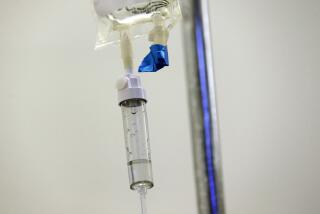Vitamins Firm Must Tread Lightly in Ads : Nutrition: A Chatsworth supplement company must adhere to strict FDA rules in its product claims.
- Share via
Late-night radio talk show host Larry King is reading an advertisement. “Ester C . . . a remarkable development in vitamin C,” he exclaims. “Enters the bloodstream twice as fast!”
What King doesn’t say in this ad for Natrol Inc.’s “Ester C” vitamin supplement is what many people who buy the product are probably thinking: vitamin C has long been said to help stave off the common cold.
It’s left unsaid because Natrol, a Chatsworth-based nutritional supplements company, isn’t allowed to make any cold-cure claims.
Like cereal companies peddling oat bran flakes, Natrol and its president, Elliott Balbert, do business in a gray area, selling products that the government considers to be merely foods with no medicinal value. But consumers often buy them, like medicines, for their health.
Natrol has grown fast lately, marketing about 20 specialty vitamin and nutrition concoctions like “Ester C,” “Natrol High” (“The country’s best picker upper!”), and “Oat Bran Fiber Caplets.” Balbert predicts the company will do $5 million in sales in the year ending this June, compared to about $2.5 million the previous year. So far this year profits have been running at 8% of sales, he says.
But Natrol is in a tricky business. Vitamin and nutritional supplements companies may describe how a product works or say what ingredients it contains, but they can’t claim it can cure a disease or alleviate a symptom. Only drug companies with licensed drugs can claim that.
Balbert admitted that he learned that lesson the hard way. In 1987, Natrol, like many similar companies, was selling an exotic product from Japan that contained organic germanium, a metallic element. In Natrol’s magazine ads, the company repeated claims by a Japanese research institute founded to investigate the substance, that organic germanium could inhibit the growth of tumors. Balbert said he was satisfied by the research.
But the federal Food and Drug Administration, he admitted, “took a very dim view of the marketing of germanium.” Balbert said an agent of the FDA came to his plant in Chatsworth to demand that the company stop making those claims about organic germanium. Natrol agreed, and it also voluntarily destroyed a few cases of the product.
Now Balbert calls the ordeal a “positive” experience because it taught him an important lesson about his business.
Since then, Natrol has become one of the better-known small companies in the health vitamin business. Natrol is a very savvy marketer, according to Tim Barringer, the nutrition director for Mrs. Gooch’s food stores, which sell some Natrol products. “Elliott is a very enterprising fellow. He seems to have boundless energy,” Barringer said.
Natrol doesn’t manufacture any of the substances it sells. It buys them from other companies, then packages and markets them. For instance, Natrol markets “Ester C” through an agreement with Inter-Cal, an Arizona company that manufactures the vitamin.
The company also doesn’t have the large research and development staff of a drug company. Natrol bought the rights to sell “Calms Kids”--which it markets as a “nutritional formula” for unusually active children--from Billy Jay Sahley, who founded and helps run a clinic in San Antonio.
Sahley said she developed the original formula as an alternative to drugs for treating hyperactivity and tested it on 250 children between 1983 and 1985. She proposed to Balbert that Natrol market the product.
Despite the name, Natrol doesn’t claim that “Calms Kids” is a hyperactivity cure. Instead, the company sells “Calms Kids” as “a nutritional formula for the active child,” the idea being that busy kids need extra vitamins. But doesn’t the product’s name imply that it’s a hyperactivity cure? “We do not want to imply that,” Balbert said. If parents use “Calms Kids” for more than a vitamin supplement, “they and their physician would make that decision,” Balbert said.
Yet even when a vitamin company’s advertising claims are in order, it can still be a trying experience to market naturally occurring substances as nutritional supplements if they haven’t been proven safe in government-approved tests.
Consider Natrol’s experience with “Calms Kids.”
Until last year, one of “Calms Kids” main ingredients was L-tryptophan, an amino acid found in some foods. For years, people have taken L-tryptophan to treat insomnia, depression--and in children, hyperactivity.
Then, last November, the FDA recalled L-tryptophan products that would result in dosages of more than 100 milligrams per day of L-tryptophan, because they had been linked to an outbreak of 30 cases of a rare blood condition that causes muscle pain, swelling and sometimes death.
No one could be certain that L-tryptophan itself was to blame, but, then again, the amino acid had never been subject to the safety tests that drugs are put through in the United States. When cases of the blood disease continued to rise, the recall was expanded in March to include almost all L-tryptophan products. By last week the federal Centers for Disease Control said 1,478 cases of the blood disease linked to L-tryptophan had been reported, leading to 21 deaths.
Balbert said Natrol wasn’t linked to any of the cases. The government hasn’t named specific manufacturers linked to the outbreak.
Many people in the vitamin and health food business, including Balbert and Sahley, have said they think the blood-disease cases are probably due to a contaminant in some of the products, and not to the L-tryptophan itself.
Indeed, Edwin M. Kilbourne, a CDC epidemiologist in charge of the government’s L-tryptophan investigation, said he was inclined to think a contaminant was to blame, because tryptophan products have been taken for years apparently without problems. Kilbourne warned, however, that it’s too early to be certain.
When the FDA announced its first recall, Natrol quickly took back all its “Calms Kids” and another L-tryptophan product from distributors, Balbert said. And rather than merely lowering levels of L-tryptophan in the products to keep them under the maximum levels of the first recall, Natrol simply stopped selling L-tryptophan altogether. So when the expanded recall was issued in March, it didn’t effect Natrol.
In fact, by then Natrol had started selling a version of “Calms Kids” without L-tryptophan.
Balbert’s next big plan for Natrol, which sells about 95% of its products to health food stores, is to try to get its products into more mainstream stores. Already, Natrol sells its “Oat Bran Fiber Caplets” in Osco and Sav-On stores around the country. With more of its products in such chains, Balbert hopes he can boost annual sales to $10 million within two years. The Larry King ads, which Balbert said cost more than $100,000, are part of a plan to boost Natrol’s exposure among people who don’t usually go to health food stores.
When Balbert started Natrol in 1980 he was thinking more about healthy hair than healthy bodies. Balbert was working as the vice president of operations for Chambre Cosmetics in Chatsworth. But Balbert wanted to get into business for himself, so he started Natrol as a shampoo company, figuring there was an opportunity in an expensive shampoo with jojoba, the oil from a desert shrub.
Taking out a second mortgage and dipping into savings to raise about $250,000, Balbert started selling the shampoo mostly in health food stores. But sales were slow, he said, because he sold 8 ounces of the Natrol shampoo for $4.95 while a competitor sold 18 ounces of a similar shampoo for $3.95. Soon he turned to nutritional supplements.
Eventually, he found vitamins and nutritional supplements a better business than shampoo. But Balbert isn’t the health food or alternative-diet zealot you might expect at the helm of a vitamin company.
“I wouldn’t classify myself as a fitness buff,” Balbert admitted. “I’m just as much prone to a Big Mac and fries as the next person.”
More to Read
Inside the business of entertainment
The Wide Shot brings you news, analysis and insights on everything from streaming wars to production — and what it all means for the future.
You may occasionally receive promotional content from the Los Angeles Times.










